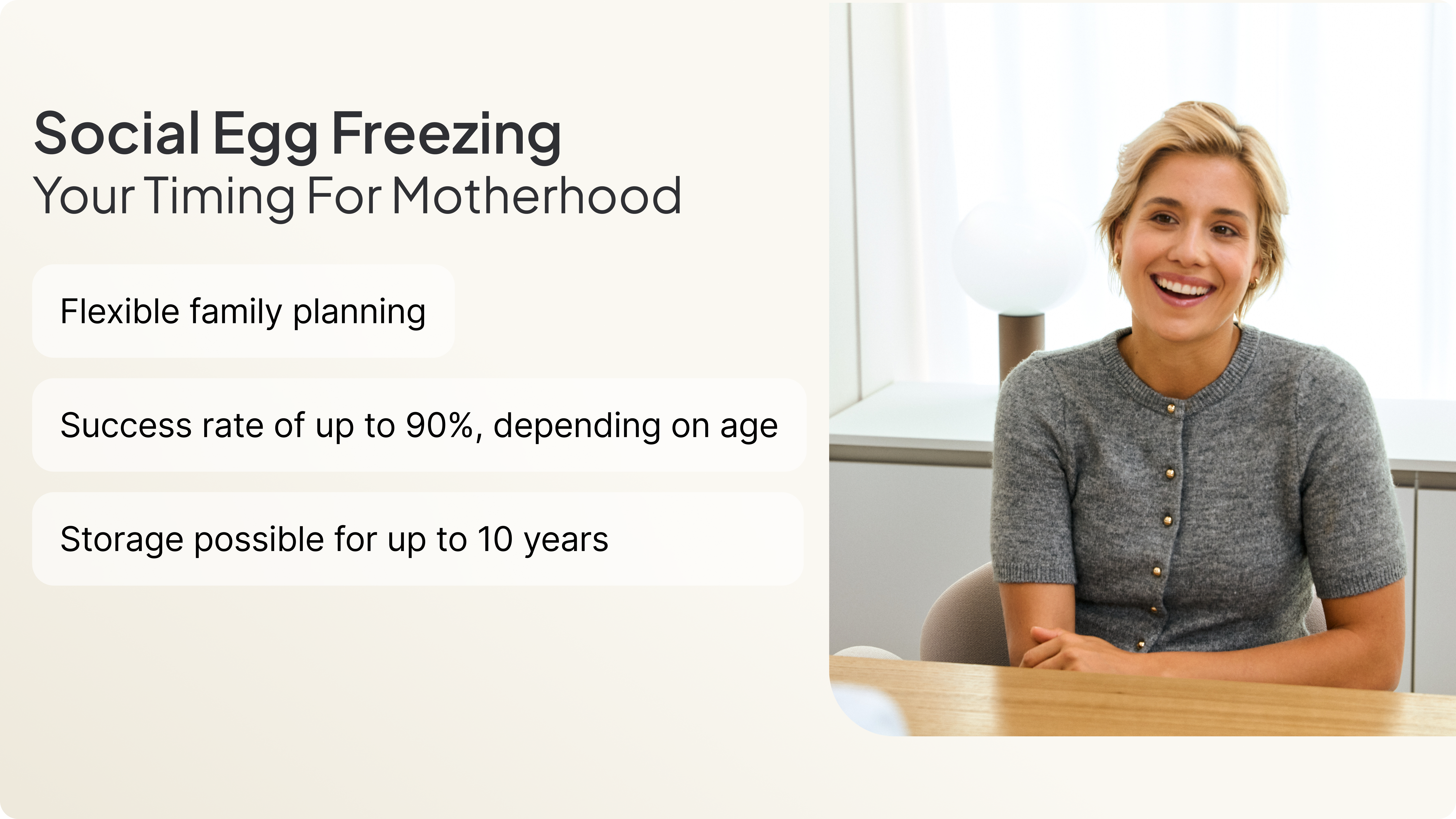Discover natural ways to boost egg quality and find out how egg freezing can support your family planning journey.
Key Facts About Improving Egg Quality:
- Egg quality declines with age
- Smoking, toxins, chemotherapy, and radiation can negatively impact egg quality
- Damaged eggs increase the risk of miscarriage
- There are no specific tests to directly measure egg quality
- A healthy lifestyle can support better egg health
Good egg quality improves your chances of conception
The quality of your eggs plays a critical role in both getting pregnant and carrying a healthy pregnancy to term. If you're struggling to conceive or have a low ovarian reserve, improving your egg quality may help increase your chances of successful fertilization.
In this article, we’ll take a closer look at what egg quality means and what you can actively do to support your fertility.

Understanding Egg Quality
In general, egg quality refers to whether an egg has all the components it needs to be viable, fertilized, implant in the uterus, and develop into a healthy embryo. A healthy egg has no damage to its structures—especially mitochondria, chromosomes, or DNA.
Egg quality is also closely related to ovarian reserve, or the number of viable eggs a woman has. Women are born with all the eggs they’ll ever have. These eggs remain in the ovaries, waiting to mature and potentially be released during ovulation, starting at puberty and continuing until menopause.
Typically, only one egg is released during ovulation each month. The others that begin maturing in the same follicle are reabsorbed by the body through a natural process called apoptosis. As a result, a woman’s egg reserve—and the number of undamaged, healthy eggs—declines over time.
Curious about your fertility status?
A fertility check can provide valuable insights into your ovarian reserve and hormone levels. Our clinic in Zurich is here to guide you—schedule your personalised consultation today.

How to Improve Egg Quality
Optimize Your Diet for Egg Health
Nutrition plays a vital role in egg quality. A balanced, whole-foods diet rich in fruits, vegetables, lean proteins, whole grains, and healthy fats is essential. Foods high in antioxidants—like berries, leafy greens, and nuts—can help reduce oxidative stress in the body.
Key nutrients for egg health include:
- Omega-3 fatty acids (found in fatty fish, fish oil, walnuts, flaxseeds): support hormone balance and cell health
- Folate (leafy greens, legumes): essential for DNA synthesis
- Vitamin C (citrus fruits, berries): supports immune and reproductive health
- Vitamin E (nuts, seeds, avocados): acts as an antioxidant
- Vitamin D (fatty fish, fortified dairy): supports hormone regulation

Try to limit processed foods, added sugars, trans fats, and alcohol. Choosing organic products can also help reduce exposure to pesticides.
Supplements That May Support Egg Quality
Certain supplements may help support egg health:
- Coenzyme Q10 (CoQ10): Supports mitochondrial function and acts as an antioxidant. Common dosage: 100–600 mg/day.
- Melatonin: An antioxidant that may support the quality of eggs and ovarian function. Common dosage: 3 mg at bedtime.
- Inositol (myo-inositol): May improve egg maturation and fertilization rates, especially in women with PCOS. Common dosage: 1200–4000 mg/day.
- Folic Acid: Important for DNA synthesis and fertility. Recommended: at least 400 mcg/day, up to 800 mcg.
- Vitamin D: Essential for hormonal health and egg quality. Often 1000–2000 IU/day.
- Omega-3 Fatty Acids: May support egg quality and reproductive health. Typically 1000 mg/day.
- Other helpful supplements: Vitamin C, Vitamin E, DHEA, NAC, selenium, zinc, acetyl-L-carnitine, B vitamins

Supplements should ideally be taken for 3–6 months before trying to conceive to influence the egg maturation cycle. Always speak with a healthcare provider before starting new supplements to find the right type and dose for you.
Exercise & Stress Management
Stress reduction techniques like yoga, meditation, or mindfulness can help balance your body’s stress response. Aim for 7–8 hours of quality sleep per night. Regular, moderate exercise—such as brisk walking, swimming, or yoga—can improve blood flow to the ovaries. Maintaining a healthy weight through movement and diet is also important for egg health.
Reduce Exposure to Environmental Toxins
To lower exposure to endocrine-disrupting chemicals (EDCs), avoid heating food in plastic containers—use glass or stainless steel instead. Look for BPA- and phthalate-free products when possible.
Heavy metals, which can be found in contaminated water or certain fish, can also be harmful. Knowing potential sources and avoiding them is key. Air and water filters may help reduce environmental toxins in your home.
Why Do Eggs Become Damaged?
The eggs a woman is born with remain immature and dormant for years—sometimes decades—until puberty. Each month, several eggs begin to mature, but typically only one reaches full maturity and is released during ovulation. Because eggs sit in this dormant state for so long, they are more susceptible to damage over time.
If the damage affects the number of chromosomes, the egg is called aneuploid. A healthy human cell has 46 chromosomes. Aneuploid eggs have too many or too few chromosomes, which can be classified as:
- Autosomal aneuploidy: Affects non-sex chromosomes; may result in trisomy 21, 18, or 13
- Sex chromosome aneuploidy: Involves abnormalities in sex chromosomes; may lead to Turner syndrome or Klinefelter syndrome
Often, aneuploid eggs don’t implant or stop developing, leading to miscarriage.
Poor Egg Quality May Lead To:
- Difficulty with implantation
- Genetic abnormalities
- Miscarriage
What Affects Egg Quality?
Age
Aneuploid eggs are a leading cause of miscarriage and birth defects. Around 10–25% of eggs from women in their early 30s may be aneuploid. For women over 40, that figure rises to more than half.
Even women in their 20s can have aneuploid eggs—though the risk increases significantly with age. The exact cause isn’t fully understood, but it's likely related to the egg’s metabolism or dysfunction in cellular structures (organelles).
Endometriosis
Endometriosis can affect the ovaries, fallopian tubes, and peritoneum. It causes inflammation and scarring, which can reduce oxygen supply to the ovaries and impair egg maturation. Adhesions can also block or narrow the fallopian tubes, making fertilization and implantation more difficult.
Chronic inflammation from endometriosis may directly reduce egg quality and overall fertility.
PCOS
Polycystic ovary syndrome (PCOS) is a leading cause of ovulatory infertility. Egg maturation is often disrupted in women with PCOS, likely due to molecular changes in the eggs and elevated androgen levels.
Medical Treatments
Some medical treatments—such as chemotherapy—target rapidly dividing cells and can damage the ovaries. Young cancer patients who undergo chemotherapy may experience premature ovarian insufficiency (POI) as a result.
Smoking & Environmental Toxins
Cigarette toxins can damage the DNA in ovarian follicles and reduce the ovarian reserve, leading to earlier reproductive aging. Smoking is associated with lower fertility in both women and men.
One study found that women exposed to active or passive smoking took longer to conceive, and male partner smoking also contributed to delayed conception. Fertility decreased with the number of cigarettes smoked.
Environmental toxins may also affect female fertility by causing hormonal imbalances, harming reproductive organs, or impairing fetal development. A 2021 study showed that persistent organic pollutants (POPs) are linked to lower follicle density in the ovaries. These industrial chemicals accumulate in living organisms and can enter the food chain.
In this podcast you will learn how to improve egg quality naturally:
Are There Tests to Measure Egg Quality?
Currently, there’s no test that can directly assess egg quality without damaging the egg in the process. For couples experiencing infertility or repeated miscarriages, fertility specialists may run tests to identify the underlying cause.
In Switzerland, couples undergoing IVF may be eligible for preimplantation genetic testing for aneuploidies (PGT-A). This can help identify embryos with chromosomal abnormalities. However, PGT-A can't always determine whether the abnormality came from the egg or sperm.
Fertility Testing Options
While egg quality can't be measured directly, general fertility can be assessed through hormone testing.
Common fertility markers include:
- Luteinizing hormone (LH): Indicates whether ovulation is occurring
- Follicle-stimulating hormone (FSH): Stimulates the growth of ovarian follicles
- Estradiol: Measured alongside FSH; high levels may mask signs of low ovarian reserve
- Anti-Müllerian hormone (AMH): Indicates the number of remaining eggs in the ovaries
Higher AMH levels generally suggest a larger pool of maturing eggs.
Preventing Egg Cell Damage with Social Freezing
Once an egg cell is damaged, it cannot be repaired. Unfortunately, modern medicine offers no way to reverse age-related damage to egg cells. However, there are several proactive steps you can take to reduce the likelihood of general cellular damage.
To reduce the risk of age-related damage to egg cells, women have the option to freeze their eggs. This process begins with hormone treatments that stimulate the ovaries to produce multiple eggs. Ovulation is then triggered with a specific injection. Following this, the woman visits a fertility clinic, where several mature eggs are ideally retrieved and subsequently frozen for future use.
You’d like to have children someday – just not right now? Feel free to schedule a consultation at our fertility clinic in Zürich to learn more about social freezing.

The motivation for egg freezing can be medical or non-medical. When there's a medical necessity, it's referred to as medical egg freezing. This option is chosen, for instance, by women undergoing chemotherapy who want to protect their eggs from radiation. In the absence of a medical reason, it is called social egg freezing.
Women who opt for social egg freezing often aren’t ready to have children yet or haven’t found the right partner but still wish to preserve their eggs in the best possible quality. There are specific conditions that must be met to use frozen eggs later on.
Takeaway: Egg Quality Is Just One Piece of the Puzzle
An intact egg cell and a sufficient ovarian reserve play a major role in a woman’s fertility. However, there’s no definitive test that labels egg quality as simply "good" or "bad" – the process of conception is far too complex for that. Common blood tests measure FSH, LH, and the sex hormone estradiol to provide general insights into your ovarian reserve and ovulation.
While egg quality is an important factor, it’s only one aspect of fertility. If you and your partner are finding it difficult to conceive, our fertility clinic in Zurich is here to support you with expert guidance and personalised care—schedule a consultation to explore your options.







